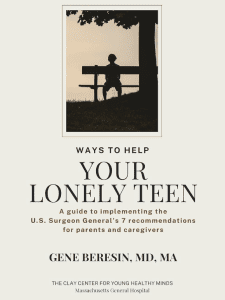Our Epidemic of Loneliness: Recommendations for Parents and Caregivers

Posted in: Hot Topics, Parenting Concerns
Topics: Healthy Living

Order your copy of Dr. Beresin’s full guide.
On May 3, 2023, The United States Surgeon General Dr. Vivek Murthy released a new Advisory calling attention to the public health crisis of loneliness, isolation, and lack of connection in our country. The Advisory lays out a framework for a National Strategy to Advance Social Connection and contains a broad range of recommendations including for individuals, governments, health systems, educational institutions, media and entertainment industries, and community organizations.
According to the Advisory, social connection is a critical but underappreciated contributor to individual overall health, community safety, and resilience. Yet, around half of all U.S. adults report experiencing loneliness, with some of the highest rates among our young people.
In support of the Surgeon General’s response to the devastating impact that loneliness can have on our mental, physical, and societal health, the Clay Center is developing a guide to help families better implement the Advisory recommendations for Parents and Caregivers.
One challenge that some may have in implementing the Advisory recommendations to combat loneliness is that practical tips and examples are not included. In our guide, you will find each recommendation followed by a more detailed explanation of its importance, and practical ways to incorporate it into everyday life.
Humans are pack animals – we need each other, we need relationships. We hope this guide helps you to increase those relationships for yourself and for the young people in your life.
Tune in for more on loneliness among teens here or wherever you stream – just search for “Shrinking It Down”.
Secure Attachments
Parents and caregivers play an important role in shaping the experience of social connection. Below are the Surgeon General’s 7 recommendations for parents and caregivers (page 65). Although focused on parents of young children, many of these recommendations can apply more broadly to all types of caregivers:
- Invest in your relationship with your child or loved one.
- Model healthy social connections.
- Help children and adolescents develop strong, safe, and stable relationships with supportive adults.
- Encourage healthy social connection with peers.
- Be attentive to how young people spend their time online.
- Identify and aim to reduce behaviors and experiences that may increase the risk for social disconnection.
- Talk to your children about social connection regularly.
Let’s take a closer look at the first recommendation in some detail, as it is the building block for the other six.
The Surgeon General specifically notes that this investment is accomplished by “recognizing that secure attachments are protective and a good foundation for other healthy relationships.” Secure attachments beginning early in life with parents or caregivers are fundamental for social, emotional, and biological healthy development throughout the life cycle.
Based on extensive research, they are grounded in a life-long dance between genetics, neurological development, and environmental experiences, and can grow and change due to the brain’s inherent plasticity – it’s ability to “rewire” itself. Secure attachments enable an individual to become resilient, manage conflicts, utilize rational cognitive skills, enhance appropriate decision making, self-regulate emotions, thwart dangerous impulsivity, assign meaning to experiences, bolster a sense of security even in the face of adversity, and seek out comfort, support and guidance from trusted peers and caring adults.
All this is grounded in healthy relationships that begin in childhood, and enable an individual to enjoy solitude, and appreciate being alone, without experiencing loneliness and commonly attendant challenges of depression, anxiety, stress, suicidal or self-destructive behavior and a number of serious medical conditions.
Finally, secure attachments are essential for a growing child, and later young adult to form an autobiographic narrative of their life and personal experiences. The personal narrative is essential for a sense continuity between experiences and is vital for a sense of wholeness, wellbeing, and cohesiveness.
In short, healthy attachments are growth promoting and protective for the individual, and are fundamental for many important life skills, including prevention of loneliness.
How does this happen?
“Invest in your relationship with your child or loved one by recognizing that strong, secure attachments are protective and a good foundation for other healthy relationships.” – Surgeon General’s Advisory, page 65
The major components required for secure attachment include these elements:
- Parent-child communication that is mutual, collaborative, and attuned to the emotional state of the child. This allows for the child to experience relationships as rewarding, respectful, and validating. Start early. From toddlerhood through adolescence and young adulthood, ask with interest and talk about their mood, interests, behavior, friends, struggles and successes. Also share your own experiences about these things, in an age-appropriate way. If this is seen as part of your routine relationship, it will pay off in the long run.
- Dialogue that is reflective and attuned to the state of the child. This enables the child to feel a deep connection with the parent and provides a sense that experiences can be shared. Young people need a safe space to be heard and understood. This means being open to all their points of view and validating that their thoughts and feelings are real and true for them. The result of empathy and being in touch with a child’s state of mind promotes the child “being seen.” When this kind of dialogue continues over time, it solidifies an inner sense of security and allows the child to not only feel seen, but “held” in the eyes of the parent. The sense of holding is fundamental to the child’s ability to be alone, without loneliness because they feel the presence of the parent even when they are not physically present.
- Ongoing correction of misunderstandings and miscommunications by the parent to help the child make sense of painful disconnections. A parent’s repair of failures in communication requires attention to reactions of the child, mindfulness, and apology. When we as parents acknowledge and correct these misunderstandings, it demonstrates that relationships are not perfect, and breaches can be resolved. It also models for the child ways to do this – assuming accountability and a sincere apology, for example, can go a long way. When we don’t address miscommunications, the child is left feeling alone, isolated, and often confused. Hence correcting our mistakes increases the bonds between us, combatting feelings of isolation and loneliness.
- Amplification of the positive in relationships and minimizing the negative. It’s important to amplify the positive in relationships and work to dispel the negatives. When a child feels optimistic and hopeful about relationships, even in the face of hardship, it helps them appreciate that with effort, disconnection can be corrected. Over the course of life there is inevitable conflict in relationships, and resolving these conflicts makes the relationship even stronger. The needed effort to engage and work things out is best suited to a positive sense that something can be done.
- Healthy identity development. Every person needs a unique identity that is acknowledged by others. Without a solid sense of self, without being known by others, we remain just a face in the crowd, invisible. If all goes well through these relational experiences, the child develops a sense of who they are, resulting in coherent autobiographical narratives that are needed for personal stability and self-awareness throughout life.
The end result of these interactions is the foundation for secure attachments. It’s fairly easy to see how they also become a foundation for combatting loneliness and support the Surgeon General’s following six recommendations. The investment in this kind of relationship is fundamental for the growing child to have a secure sense of self that then allows them to feel connected to others (first the parent, then many others in their lives), even when alone. And they can truly enjoy themselves, both in the presence of others, and in their solitary activities with a sense of optimism and personal wellbeing.
They are then prepared with hope and the strength to face adversity, whether it is through a pandemic, social unrest, the dangers of social media as well as challenges that may derive from periods of social disconnection.

 Share
Share Tweet
Tweet





